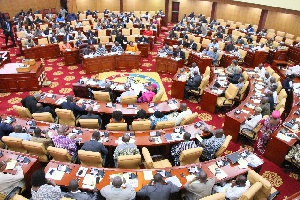The Office of the Special Prosecutor Bill, 2017, has been laid before the Parliament of Ghana.
However, the laying of the document was greeted with protest from the Minority National Democratic Congress (NDC) Members of Parliament (MPs) who alleged some acts of illegality in the process.
NDC MP for Bolgatanga East, Dr. Dominic Akuritinga Ayine, commenting on the document said the Bill had not been gazetted fourteen (14) days prior to its introduction to the legislature, doing so amounts to illegality on the part of the government.
“Mr. Speaker, one key thing of the Standing Orders which require that before a Bill is introduced in this House, it must be gazetted 14 days prior to its introduction into this House. And the Majority Leader has just pointed out that there is some disparity – so we want to see the gazetted evidence so that it conforms to what is being laid here,” he noted.
Order 120 (1) of the Standing Orders of the House which is premised on Article 106 (2) of the Constitution of which Dr. Ayine based his argument on states that “Except as provided in Orders 119 and 112 no Bill shall be introduced unless the text of the Bill, with no variations other than such as, in the opinion of the Parliamentary Draftsman, are of a trivial or drafting character, has been published in the Gazette fourteen days before the date of its introduction in the House.”
Article 106 (2) of the Constitution states that “No bill, other than such a bill as is referred to in paragraph (a) of Article 108 of this Constitution, shall be introduced in Parliament unless –
It is accompanied by an explanatory memorandum setting out in detail the policy and principles of the bill, the defects of the existing law, the remedies proposed to deal with those defects and the necessity for its introduction; and
It has been published in the Gazette at least fourteen days before the date of its introduction in Parliament.
The former deputy Attorney-General, alarmed by this contravention of the above provisions in the Standing Orders of Parliament and the 1992 Constitution, therefore, craved the indulgence of the Speaker to direct the Attorney-General to produce the gazette notification to the House for their perusal.
“Mr. Speaker, compliance to the constitution is very important, particularly when you are introducing important bills such as that of the Office of the Special Prosecutor which has dire implications on Ghanaians. I was expecting that we follow due process of the law and conform to the dictates of the Constitution.”
But his argument was strongly challenged by the Majority Leader, Osei Kyei-Mensah-Bonsu.
Quoting Article 106 (13) to buttress his point, Mr. Kyei-Mensah-Bonsu said once the bill is of urgent nature which will be determined by a committee which the Speaker will refer the document to, the argument advanced by the former Attorney-General was therefore flawed and should not be allowed to stand.
“Mr. Speaker, he [Dr. Ayine] is totally out of tangent. What this means is that for the whole of Article 106 when a bill is determined to be of an urgent matter, this provision … Mr. Speaker, you have referred the matter to a committee. Government considers this bill to be an urgent one. The determination, therefore, behoves on the Committee that you have referred the bill to, to make a determination,” he noted.
Article 106 (13) states that “Where it is determined by a committee of Parliament appointed for the purpose that a particular bill is of an urgent nature, the provisions of the preceding clauses of this article, other than clause (1) and paragraph (a) of clause (2) shall not apply, and accordingly, the President shall give his assent to the bill on its presentation for assent.”
The Zongo Development Fund Bill, 2017 was also laid on the floor.
The two Bills were subsequently read a First Time following which the Speaker, Rt. Hon. Prof. Aaron Michael Oquaye, after listening to arguments from both sides of the House referred them to the joint committees on Legal, Constitutional and Parliamentary Affairs, Local Government and Rural Development and Finance for consideration and report to the House.
General News of Wednesday, 19 July 2017
Source: kasapafmonline.com













